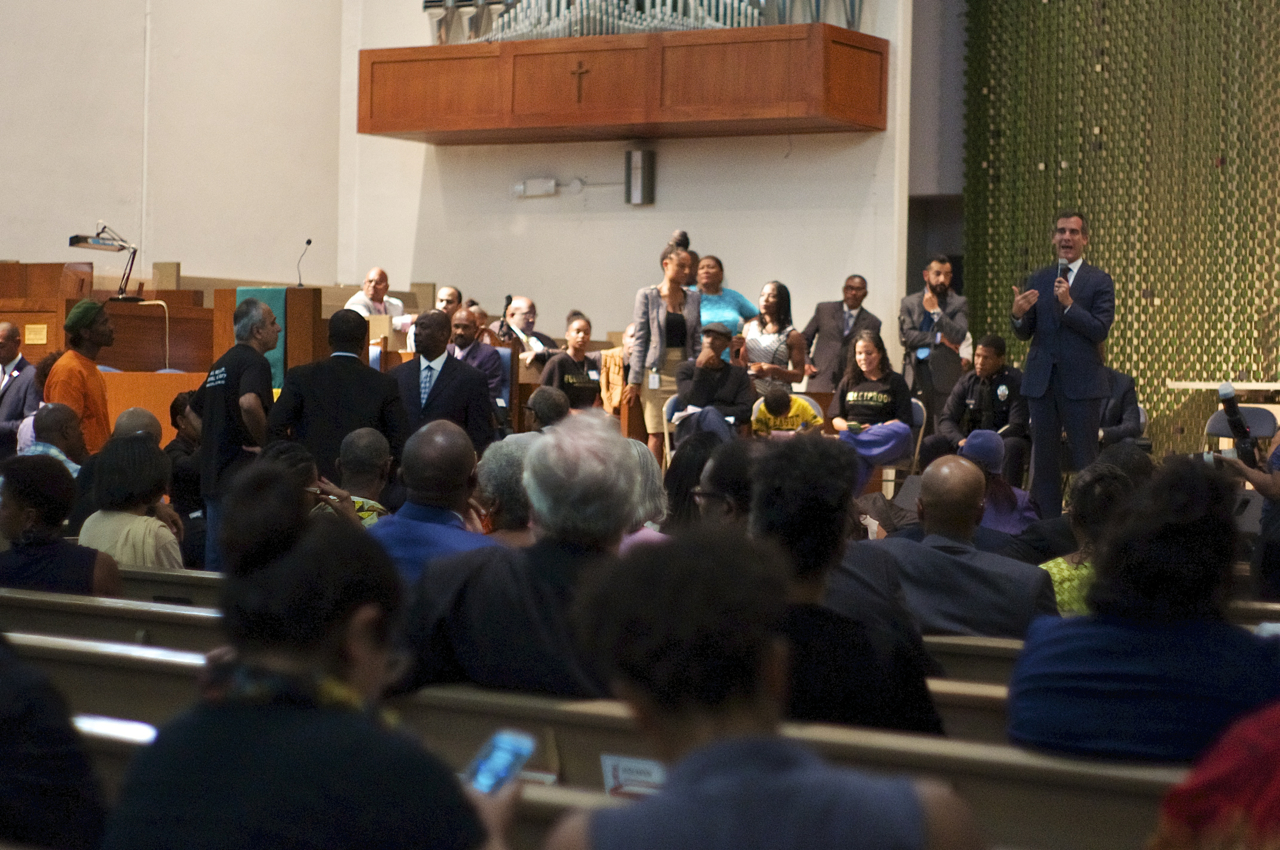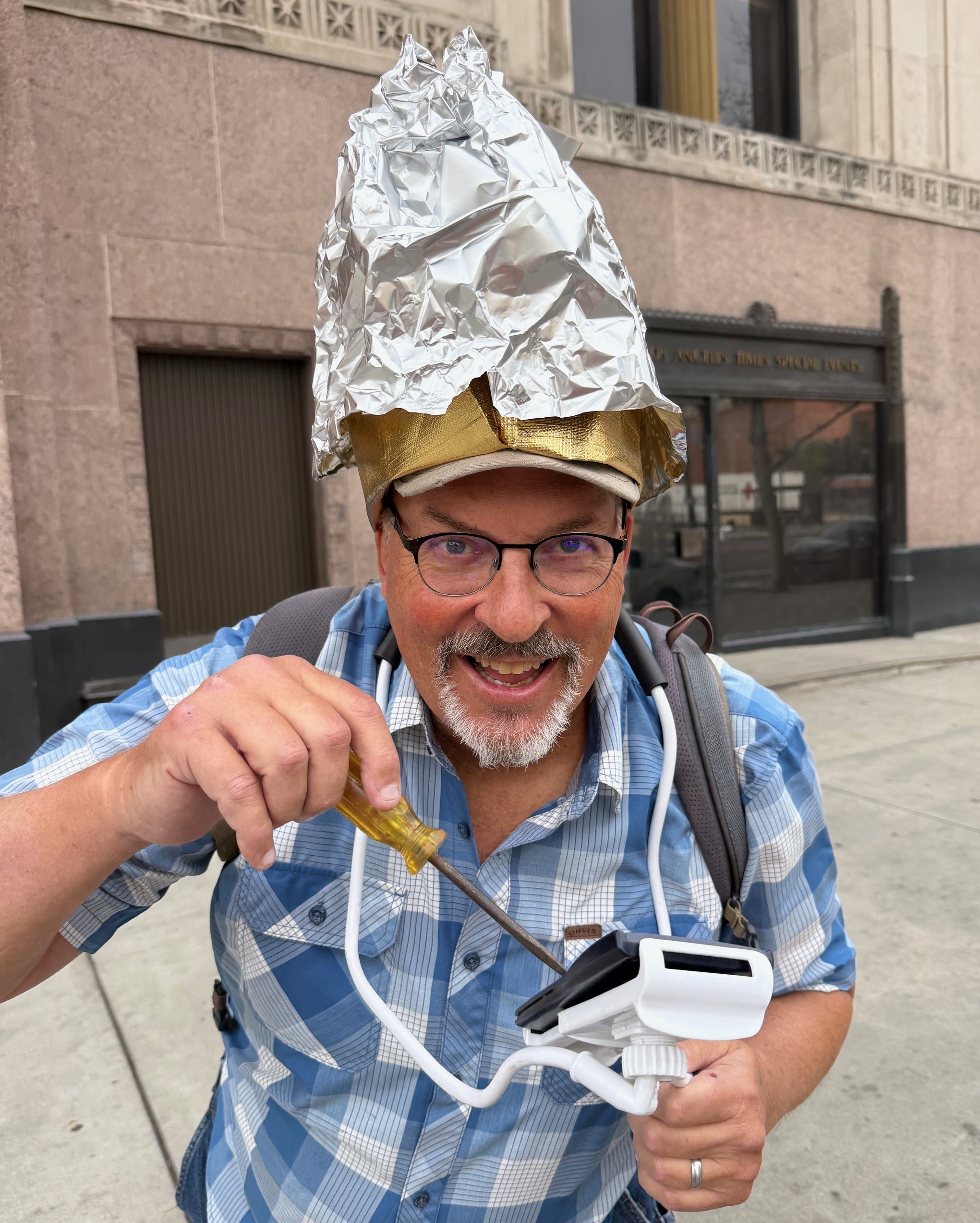Really? A helicopter??
The aircraft swooped in low and fast outside Holman United Methodist Church Monday night as Mayor Eric Garcetti's first ever South L.A. Town Hall came to an otherwise unceremonious close.
It was a little after 8 p.m., and pleas from an exasperated Reverend Kelvin Sauls that those "interested in having a civil conversation...remain here" had fallen on deaf ears. When members of the Black Lives Matter movement -- who had turned their backs on Garcetti and his staff when they spoke, interrupted speakers, chanted "Black Lives, they matter here!," and finally ascended to the stage to take the mic -- began shouting Garcetti down in earnest, dialogue was finally rendered impossible.
The next thing we knew, the mayor was being whisked off the stage and out the door, buffered on all sides by city staffers and police.
The meeting was effectively over.
Adams Blvd. between 5th and Arlington was quickly shut down as protesters surged outside to surround the mayor's car. The aforementioned helicopter arrived shortly thereafter.
What were attendees supposed to make of what just happened? And just how hysterical was the coverage of the meeting going to be the next day?
As for the latter: pretty hysterical.
Right wingers from Breitbart.com and The Blaze (neither of which was present at the event), wrote of the mayor being "forced to flee" the event and needing to be "escorted to safety," giving their following the ammunition needed to declare the protesters to be (in some of the more G-rated comments, at least) jobless "thugs," "racists," and "terrorists."
Local coverage of the event wasn't a whole lot better, painting Black Lives Matter as only being interested in disruption and being out of step with the majority of the Black community. Reports focused on the "chaos," the meeting as a "hotbed of civil disobedience," the "aggression" of speakers, and the actions of activist Jasmine Richards, who jumped on Garcetti's car, prompting readers to post many of the same kinds of racist denouncements found on the right wing websites. Weirdest of all was seeing a Fox11 reporter - who had not been at the meeting the night before and who had no idea what was behind the protests he claimed had "nearly ambushed" the mayor - stand outside a city administration building the next morning and wonder on air why no protesters had shown up to heckle the mayor as he met with HUD secretary Julian Castro about homelessness.
Even Garcetti himself took a swing at Black Lives Matter, telling ABC7 that "Disrupting a meeting is an easy thing, but I'm about forging a coalition moving forward."
None of which is surprising, of course, but is disheartening all the same.
As for the question of what attendees were supposed to make of what just happened, the answer was much more complicated.
These were South L.A. residents and advocates. There was nobody I spoke with that did not understand where the anger was coming from. While the core group of protesters may have been small (anywhere between 20 and 50 people), their concerns had the empathy of many in attendance. At least, up to a point.
When Dr. Melina Abdullah, professor of Pan African Studies at Cal State L.A. and an organizer with Black Lives Matter, had taken the mic toward the end of the meeting and explained why people were turning their backs on the "back door mayor," there were nods and murmurs of understanding.
Black Lives Matter had consistently asked the mayor to sit down with them in quarterly town halls to work with them on addressing police brutality, police reform, and community empowerment. Over the summer (just prior to the Police Commission's ruling on the fatal police shooting of Ezell Ford), they had even staked out Garcetti's home trying to get him to agree to a meeting, only to have him sneak out his back door on his way back East to do some fundraising. Abdullah told town hall attendees that because all their requests had been ignored - they had not even been formally invited to the event, despite having been the ones that had asked for it - they were resolved not to sit down until given seats on the stage. [They were eventually seated there with the help of Damien Goodmon of the Crenshaw Subway Coalition.]
"We are appreciative of this space," she said, "but [Black Lives Matter] created this space."
It was a claim many of the elders in the community might have disputed. Some I spoke with after the meeting were shaking their heads over the fact that they found themselves confronting so many of the very same issues they had gone up against as activists in their youth - that young men were still dying at the hands of police and there was still no accountability. And Reverend Sauls, an important advocate for the South L.A. community on a wide range of issues since arriving at Holman in 2012, had been the one to moderate a meeting between the Black Lives Matter advocates and the mayor at Holman this past July.
But her larger point stood: they were being excluded from a process that they had helped set in motion. Hearing the mayor talk about the importance of respectful dialogue and communication was only adding insult to injury.
And the question she had for African-American entertainment lawyer Matt Johnson - newly appointed head of the Los Angeles Police Commission - about whether he would "authentically represent the black community" was not an inconsequential one.
Concerns about the public's inability to access body cam footage and about the extent to which police officers' ability to review footage before writing reports or giving statements to internal investigators could impact cases where the use of force was in question have been front and center since before body cameras first hit the streets last month.
So have questions about whether or not bad behavior will be duly punished. Officer Sharlton Wampler was found by the commission to have used tactics against Ford that violated LAPD policy, resulting in his death, yet LAPD Chief Charlie Beck has yet to announce any charges against Wampler or his partner, Antonio Villegas. And few seem convinced by Johnson's promises that a "full day" of "state-of-the-art" training on preservation of life, de-escalation, the handling of the mentally ill, and constitutional policing would help ensure that "we have as few abuses of power as possible."
"We are here because this is real for us...," Abdullah said. "This is not about politics, this is not about your re-election, this is about our lives!"
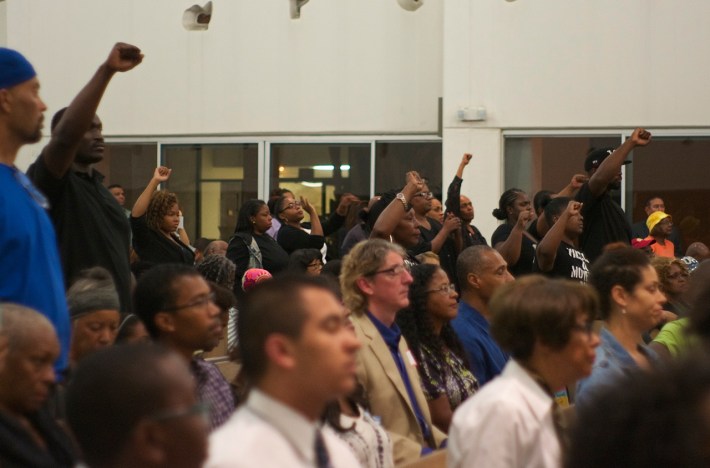
But attendees had a number of other concerns they wanted heard, too.
How would the mayor address the structural violence perpetuated by decades of disinvestment, disenfranchisement, discrimination, denial of opportunity, and the criminalization of poverty in South L.A.? Together, these factors had created the conditions that allowed for the negative stereotyping of particular groups and the sanctioning of the suppressive tactics used against them. Yet, both policy and wider public opinion have been slow to acknowledge and adjust to that reality.
"There is no such thing as black-on-black crime," Chimbuko Tembo, associate director of the African American Cultural Center, declared emphatically. Saying that there is such a phenomenon only "racializes crime and criminalizes a whole people."
When the mayor agreed that the problems facing areas like South L.A. were indeed deep, structural, and "brutal," a second speaker joining Tembo on stage interrupted him. What specific partnerships and strategies had the mayor put in place to address those issues and the resulting poverty-driven violence? To too many in the community, it had felt like the only response had been increasingly intensive policing.
Searching for a way to answer what is actually a complicated question and, it seemed, to speak to the activists that kept their backs turned to him, Garcetti began, “Let me say, you're right, your analysis... I hate this back-and-forth we hear nationally, where people say, 'Black lives matter,' and politicians say, 'All lives matter.' Black lives matter in a unique way, and you and I see eye to eye on this.”
"If you just try to say, 'All lives matter,'" he continued, picking up some momentum, "you write people out of history. You write slavery out of history. You write oppression and violence out of history. You write racism and lynching out of history. So, I get why it is important — just hear me out for one second — you're right.”
Policing wasn't going to be enough, Garcetti agreed, "We have to have strategies" to address the violence of homelessness, joblessness, poverty, foster care, and the like.
"It's why I ran for mayor," he said. "If we don't break the cycle, we are lost."
To that end, he continued, he had pledged to see 100,000 units of housing built in eight years. He had expanded the domestic violence response program (DART) within the LAPD so that all 21 divisions now had DART teams. He had invested more money and time in building relationships with gang interventionists and had extended Summer Night Lights programming into the fall to give young people a safe place to go. And these programs were all in addition to the effort he had spoken about earlier to create jobs that provided a "pathway to progress," including the hiring of a coordinator to aid those returning from prison (because "they [were] getting out of jail and there [was] no plan for them"), finding summer jobs for 12,000 young people, raising the minimum wage, winning a $6 million grant to aid those that are hardest to employ, and offering employment assistance to veterans.
Not satisfied with that answer, the young man asked again about the specific relationships the mayor had built that would help ground any fixes in the community and make them more sustainable over time. Garcetti looked to the coordinator for GRYD - the office of Gang Reduction and Youth Development that runs the Summer Night Lights programs and other intervention work (and which has sometimes been characterized as overly bureaucratic and/or not able to play well with others) - to ask how many groups they were working with now on those issues. Around thirty groups, came the answer.
Instead of taking a moment to elaborate on what that meant in practice, however, Garcetti passed the mic to Metro's new CEO, Phil Washington.
And, yes, that was just about as awkward a transition as it sounds.
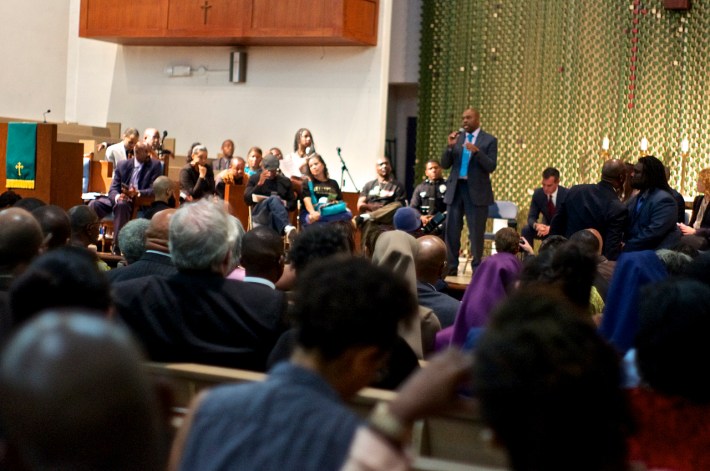
It would have made more sense to bring Washington into the conversation when Damien Goodmon asked how L.A.'s 2024 Olympics bid might make it possible to extend the Purple Line underneath Wilshire Blvd. on an accelerated schedule but no such funds could be found to protect the city's last black commercial corridor along Crenshaw, where the train is set to run above ground. Or when trained construction worker Cornell Jones spoke of the challenge black workers faced (himself included) getting and keeping good jobs in an industry where black workers are the minority and "it is not what you know but who you know that matters."
Awkward timing aside, Washington seemed to relish the opportunity to introduce himself to the crowd, telling them that he understood them and knew their concerns. He had grown up in the projects, he said, and, referencing concerns about the lack of black workers working on the Crenshaw Line, "saw what it was like when people [working in my community] didn't look like me."
He was committed to "leveling the playing field" by offering aid to small businesses so they could stay in communities where transit construction was underway and preparing workers to be able to work not just on the Crenshaw line but "all over this region." He had recently delayed a proposal, he said, to make sure that the language in it supported small businesses and job creation for the community.
We have to be concerned about our communities being displaced through transit construction, he concluded, and we must work to make sure transit benefits the communities and businesses around it. He was, he reiterated, "totally committed to getting our young brothers and sisters jobs."
It was the last upbeat note of the night.
Shortly after Washington spoke, Abdullah took the mic to explain the protesters' rationale, to declare, "We don't need to get close to the mayor to have power!" to introduce the mother of Kendrec McDade, to lead the community in chanting "Black Lives, they matter here!" and to interrogate the motives of both Garcetti and police commissioner Johnson with regard to police reform.
Garcetti found himself calling for respectful dialogue just as the sanctuary began to erupt in noise, and was unfortunately never able to regain control of the crowd.
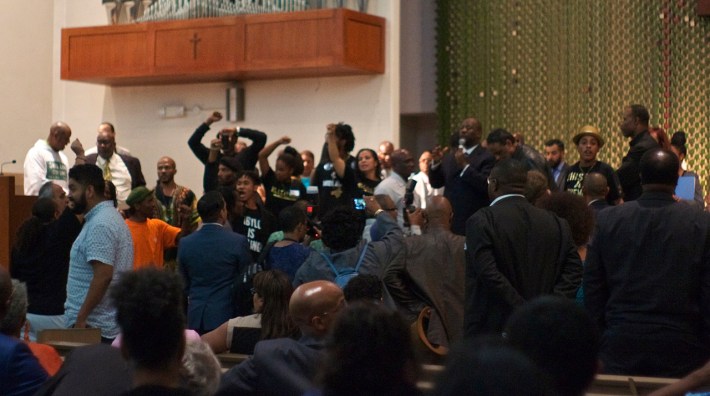
Garcetti was ushered out soon after, taking the noise, the protesters, and, of course, the TV crews with him.
He would make no other statement to the press that night, save an official one sent out after he left:
Tonight, we had hundreds of South L.A. residents attend a community meeting — leaders, business owners, mothers and children, who took time out of their evening to discuss the critical issues that matter most to all of us. I am disappointed that our conversation was cut short when there is so much work for us to do together to make our neighborhoods stronger and safer. I believe in our City and my commitment to our shared concerns continues, stronger than ever.
The meeting may have officially been over, and folks may have been disappointed and even angry that that was the case, but this was South L.A. The attendees - many of whom were long-time community advocates - had come ready for a dialogue, and dialogue they did. They continued to talk amongst themselves about the future of the community for another hour, concluding their parking lot conversations only after being told leaders needed to lock up the gates. They had needed that time to process how they felt about what they had seen and heard and to talk about what they had been hoping to hear.
Many wanted to hear more about jobs -- black unemployment in some areas of South L.A. hovers around the levels seen just prior to the 1992 unrest. African Americans were the first to lose their jobs in the 2008 recession and have been the last to get them back. What kinds of jobs and community investment might the Olympics bring, and for whom? How would improved transit help take people to jobs, or provide better, more stable, and more lucrative jobs?
Others wanted to hear about housing and gentrification. Metro's Phil Washington might be deeply dedicated to creating Transit Oriented Communities, but what did that really mean in practice for the renter looking to buy in the neighborhood they grew up in where transit is fueling real estate speculation? And what about when that speculation was facilitated by the subprime mortgage crisis in which so many families of color lost their homes? How would historic and cultural communities be acknowledged, preserved, and elevated? And how would renters be able to avoid displacement?
What real investments were being made in at-risk young men of color? This past summer had been deadly in a way that would have been framed as a heartbreaking emergency of national concern had it happened in a whiter, well-to-do suburb. How could we ensure that these youth were being reached and nurtured rather than targeted, harassed, victimized, and criminalized just for moving through the public space?
And finally, what comes next?
Disruption (and the threat of it) has become an important tactic in keeping the issues of police brutality and police reform front and center.
But structural change remains elusive. The police commission recently tightened its rules on protests during meetings to curb disruptions. And Abdullah herself was thrown out of a police commission meeting yesterday morning in what she described as record time - just 60 seconds.
Those I spoke with hoped that this town hall would not be the end of the conversation - there is too much work to be done, too much left hanging in the balance, too many lives at stake. And with so many of South L.A.'s more vulnerable residents feeling the squeeze as their historic neighborhoods undergo transitions, residents do not have the luxury of time on their side.
A statement issued by the mayor yesterday morning acknowledged the urgency of this conversation and reiterated his commitment to continuing to work with South L.A. residents on their "shared concerns."
May that happen sooner (and more frequently) rather than later.
